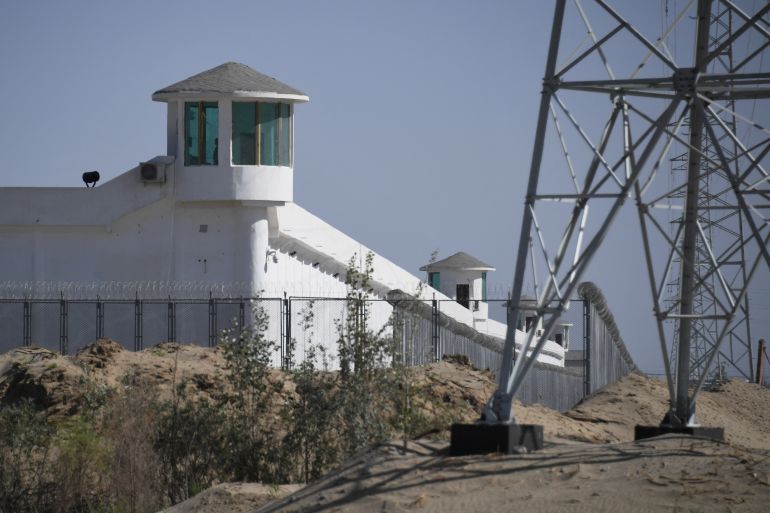UN head hopes China will ‘take on board’ Xinjiang recommendations
UN Secretary-General Antonio Guterres’s spokesman says he was ‘concerned’ by what he read in the report, which cited possible crimes against humanity.

UN Secretary-General Antonio Guterres hopes China will “take on board the recommendations” made in a report by the organisation’s Human Rights Office on the situation in its Xinjiang region, a spokesman said.
The report by UN human rights chief Michelle Bachelet “confirms what the secretary-general has been saying on Xinjiang for quite some time, that human rights must be respected and that the Uighur community need to be respected,” Guterres’s spokesman, Stephane Dujarric, told reporters on Thursday.
Keep reading
list of 4 itemsBachelet: Pressure ‘will not affect’ report on China’s Uighurs
The Turkish school preserving culture of young Uighurs in exile
China’s treatment of Uighur Muslims exposed
Dujarric added that Guterres was “concerned” by what he had read in the report, which cited possible crimes against humanity.
In its long-delayed report, the human rights office found that China’s detention of Uighurs and other mostly Muslim ethnic minorities in northwestern Xinjiang may amount to “crimes against humanity”.
Beijing has vigorously denied any abuses in Xinjiang, and its own assessment of the situation was attached as an annex.
US Secretary of State Antony Blinken welcomed the UN’s publication of its findings, which had been the subject of intense diplomatic maneouvring.
“This report deepens and reaffirms our grave concern regarding the ongoing genocide and crimes against humanity that PRC government authorities are perpetrating against Uighurs,” Blinken said in a statement released by the State Department.
The European Union’s High Representative Josep Borrell also welcomed the report, saying the 45-page document recounts rights violations in China that could amount to “crimes against humanity”.
The report, published minutes before the end of Bachelet’s term, called on Beijing to immediately release “all individuals arbitrarily deprived of their liberty”.
It also called on China to clarify the whereabouts of those whose families have been unable to locate them and undertake a “full review” of its laws on domestic security and repeal all discriminatory laws.
Borrell paid tribute to Bachelet for her “leadership and tireless efforts in defending the rights of all”.
“As the report states, the human rights situation in the Xinjiang Uyghur Autonomous Region requires urgent attention by the Chinese government, the United Nations, in particular, its human rights bodies, as well as the international community more broadly,” he said.
“The EU joins the call by UN experts reporting to the Human Rights Council to closely monitor, report, and assess the human rights situation in China.”
For its part, the United Kingdom said it will continue working with international partners to try to change China’s actions.
“The report … provides new evidence of the appalling extent of China’s efforts to silence and repress Uighurs and other minorities in Xinjiang,” British Foreign Secretary Liz Truss said.
“We will continue to act with international partners to bring about a change in China’s actions, and immediately end its appalling human rights violations in Xinjiang,” Truss said.
Efforts ‘finally paid off’
The report came four years after the UN Committee on the Elimination of Racial Discrimination (UNCERD) revealed that more than one million people were being held in a network of detention centres across Xinjiang. Further details of the crackdown emerged as Uighurs who had managed to get out of China, academics and human rights groups alleged abuses from forced sterilisation to family separation and religious humiliations.
Uighurs interviewed by the Reuters news agency in Turkey’s capital Istanbul expressed disappointment over the latest report, saying it should have gone further in challenging China over its treatment of their community in Xinjiang.
Some 50,000 Uighurs are estimated to live in Turkey, the largest Uighur diaspora outside Central Asia. Turks have close ethnic, religious and linguistic ties to the Uighurs.
Mukerrem Abitoglu, a Uighur who travelled to Turkey with her youngest daughter in 2017, said the report did little for her people.
“We filed our complaints to 15 countries. Journalists came. We spoke to them but it was no good,” Abitoglu said as she cried in her small shop where she sells Uighur-designed gifts.
“China kills our young people, leaves our children orphaned, so what they [the United Nations] do now is not enough,” said Abitoglu, who has not heard from her husband and her two children for the past five years.
The head of the NGO group East Turkestan New Generation Movement, Abdusselam Teklimakan, also said the report came late, while Uighurs were year after year worrying about the fate of their loved ones in Xinjiang.
“When a nation is destroyed, it is not appropriate for humanity to watch them being destroyed for a couple of years. In this respect, this is a disappointment,” Teklimakan added.
But for other exiled Uighurs, the report was a long-awaited vindication.
Zumret Dawut burst into tears when the findings were published. Her mind flashed back to her cellmates in the camp where she was detained and to her father who died while in Xinjiang police custody.
“I felt there was justice, that there are people who care in this world,” she said. “I felt like our testimonies, our efforts to raise awareness have finally paid off.”
For Dawut and other camp survivors now outside China, the UN’s report was the culmination of years of advocacy, a welcome acknowledgement of abuses they have said they faced at the hands of the Chinese state.
The significance of the assessment, survivors said, is the weight and authority of the UN.